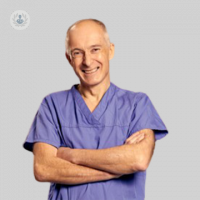Common voice problems
Written by:The most common cause of voice problems are short-term respiratory tract infections which are managed by general practitioners. If a voice problem goes on for longer than three weeks, patients should be referred to see a specialist. We hear more on this topic from expert ENT specialist and renowned surgeon Professor Martin Birchall.

Causes of voice problems
The most common cause of longer-term problems with the voice are, firstly, tension, a tightness of the larynx and the muscles around it. This can result from stress, may be a leftover of an upper respiratory tract infection, or can be the result of using the wrong muscles to talk with as we get older. All of these problems can be diagnosed in clinic.
Another common cause of voice problems is reflux, an epidemic in the western world. People are getting more and more overweight and their diets aren’t ideal. Acid coming up from the stomach can not only affect the gullet or the oesophagus but it can also affect the larynx, as well causing inflammation and voice problems.
Diagnosis
We use small telescopes to look at patients’ throats. These may either be passed through the mouth or, more commonly, through the nose which gives us clear views of the throat. allows us to diagnose voice problems at an early stage and give people accurate treatments and diagnoses.
Hoarseness
When one cord is not moving properly in the voice box, it results in hoarseness. People find it difficult to generate any power. In fact, they have to produce about eight times the normal amount of power to get the kind of voice that most people would generate normally. This is very tiring and they run out of breath. Also because the vocal cords don’t come together properly, food and drink might go down the wrong way, leading to problems with eating and drinking. Problems with fluids can lead to repeated chest infections.
Vocal cord paralysis
Now, most people with vocal cord paralysis get better over a period of six months to a year. During that time, they can be managed easily by a combination of speech and language therapy and vocal cord injections. Where the paralysis is more permanent, we use a different approach, we push the cords closer together on a permanent basis. The method of doing this is to create a small block of medical grade plastic called silastic and to carve it into a wedge shape that fits into the side of the voice box and pushes the cords closer together.
If you would like to schedule a consultation with Professor Birchall, you can do so by visiting his Top Doctors profile.


